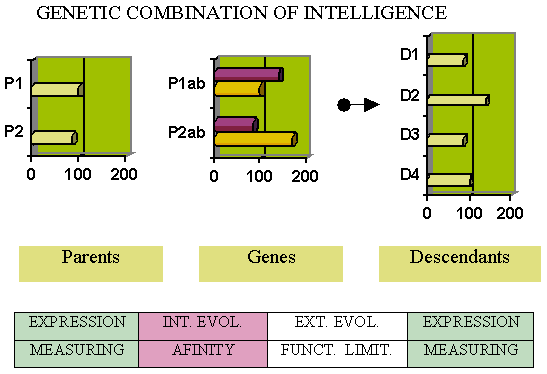Intellectual Ability and Heritability
Many researchers have studied how our intellectual abilities are affected by genetics. Most believe that a large number of genes each play a small role in our intellectual abilities, but it is difficult to isolate and identify these genes.
Imagine you have a number of necklaces with 20,000-25,000 similar beads strung together. Now imagine you are looking for 3,000 specific beads on each necklace, but you’re not sure what they look like or even if they will look the same on each necklace. This is a bit like trying to find the genes that influence our intellectual abilities.
Genetic research in this area can also be challenging because intellectual ability, or intelligence, is considered a complex trait. A complex trait is a trait that is influenced by many different genetic and environmental factors. Because intellectual ability is a complex trait, most researchers recognize that the genetic portion of our intelligence cannot be completely separated from the environmental influences we each experience. Even though researchers acknowledge the important role that environment plays, studies show a significant level of heritability in intellectual ability.
Heritability is the amount of variability that is genetic in origin. Heritability is measured with a value between 0 and 1. A heritability of 1 would indicate that all of the variation is genetic in origin. A heritability of 0 would indicate that none of the variation is genetic in origin. Depending on which research study you examine, intellectual ability has an estimated heritability between .4 and .8. Most researchers agree to a heritability for intellectual ability that is somewhere around .5. This means that evidence suggests our genetic makeup plays a significant role in intelligence.
Twin and Adoption Studies
Some of the most convincing evidence for a genetic component to intellectual ability is provided by twin studies. Researchers have performed many studies comparing the IQ of fraternal twins and the IQ of identical twins. Identical twins come from the same fertilized egg. Because of this, they share 100% of the same DNA. Fraternal twins share only 50% of the same DNA because they come from two separate fertilized eggs.
Identical twins were found to have IQ scores that were more similar than the IQ scores of fraternal twins. This was even true when the identical twins were raised in separate households. This discovery can reasonably be attributed to DNA. This means that we can assume that genetic influences account for the similar intellectual abilities of identical twins.
A major challenge in neuroscience is finding which genes affect brain integrity, connectivity, and intellectual function. Discovering influential genes holds vast promise for neuroscience, but typical genome-wide searches assess approximately one million genetic variants one-by-one, leading to intractable false positive rates, even with vast samples of subjects.
Even more intractable is the question of which genes interact and how they work together to affect brain connectivity. One study that looked at genetic correlations between thousands of points in human brain images from 472 twins and their nontwin siblings (mean age: 23.7 ± 2.1 SD years; 193 male/279 female), combined clustering with genome-wide scanning to find brain systems with common genetic determination, found a network of genes that affect brain wiring in healthy young to suggest computationally more tractable to discover genes that affect brain integrity. The gene network showed small-world and scale-free topologies, suggesting efficiency in genetic interactions and resilience to network disruption. Genetic variants at hubs of the network influence intellectual performance by modulating associations between performance intelligence quotient and the integrity of major white matter tracts, such as the callosal genu and splenium, cingulum, optic radiations, and the superior longitudinal fasciculus.
The researchers also found that some of the variants are associated with intelligence, in that individuals carrying them performed several points better on standardized IQ tests than others. The variants seem to amplify each other’s effects, so that possessing more than one provided a synergistic IQ boost.

for more details visit : http://www.molwick.com/en/
http://www.nature.com/index.html
